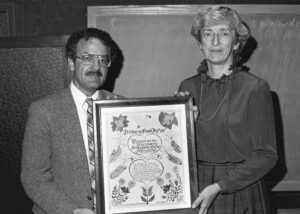A rant is taking shape in your brain, anger is seething in your gut, your finger is poised over the “post” button. What could possibly go wrong? One option is to step away from your device, take a deep breath, and think “reconciliation.”
That is the advice offered in the new book, Posting Peace: Why Social Media Divides Us and What We Can Do about it. Author Douglas S. Bursch explores the effects of social media on human behaviour and offers a particular challenge to Jesus-followers.
Echoing media experts like Marshall McLuhan, Bursch explains how onscreen communication changes the way humans process and share ideas; it changes the way we function together. The technology of our online lives promotes division and polarization, rather than empathy and connection. The various social media platforms themselves invite a centering on oneself—one’s image—rather than helping to create understanding between people. Even if our intentions are good, our consuming and our sharing of content online distorts and often limits relationships to our own heterogenous circles.
Christians might say they love the truth and see social media as a place to share that truth with the world. Yet, as everyone else in that online space, we too are tempted to engage in forms of expression that are unkind and destructive.
In my own Twitter and Facebook feeds I see people promoting their causes through postures of arrogance and contempt for anyone who thinks differently. Posts dripping with sarcasm might appeal to followers with similar views, but they do little to convince me of the rightness of a particular cause. I see derision but rarely an invitation to understanding or dialogue. I just want to mute those voices.
Bursch asks the challenging question: “What if we took the Sermon on the Mount seriously in our digital environments?” He points to the Apostle Paul’s reminder in 2 Corinthians 5: “Therefore, if anyone is in Christ, the new creation has come. The old has gone, the new is here! All this is from God, who reconciled us to himself through Christ and gave us the ministry of reconciliation. . . . We are therefore Christ’s ambassadors, as though God were making his appeal through us.”
Using the hashtag #Posting Peace, Bursch invites Christ’s digital disciples to live out that reconciliation on the screen. “For peacemakers, every online interaction presents us with the opportunity to make room for the reconciling presence of God,” he writes.
This challenge should resonate with us Anabaptists, who already profess a strong commitment to making peace in our physical environments. How might we live in the world of Facebook, Twitter, Instagram, and TikTok if our posts there reflected the challenge of #PostingPeace?
“In a polarized, divisive age, we must intentionally examine the motivation of our hearts when communicating truth,” states Bursch. “If we lose sight of love, we lose sight of our purpose for communicating.”
Here are some digital friends I want to emulate. One friend uses Facebook to start conversation among his friends. He offers thoughtful questions that we can engage with—matters of the arts, history, and theology. Occasionally, he shares a question or doubt he’s struggling with and invites ideas from his online friends. He expresses curiosity and openness and, when he pushes back on an opinion, his approach is gentle.
Another friend posts on both Facebook and Twitter, calling attention to issues of politics, ethics and justice. Her posts acknowledge the complex realities in her own community and in the larger world. She amplifies the voices of people who are marginalized. Her tone is friendly and calm. She invites followers to respond with their insights on the topic. It’s clear that she will treat you with respect, no matter what you offer to the conversation.
Some of my social media contacts offer beautiful images, with short prayers or quotations to ponder. Their humourous content is respectful. Sometimes, they tell stories of challenges they’re facing, or successes achieved, not to call attention to themselves but as a member of a community that cares. Their posts express love for other people, the world, and for God.
Bursch reminds us, “Focusing on who is in the room helps me view social media disagreements not as ideological debates but as human interactions between real individuals, people God actively pursues with his kindness and grace.” He continues, “Peacemaking facilitates environments where people experience the living presence of the Prince of Peace. . . . Healthy Christian communication makes room for the movement and activity of God.”
What does digital reconciliation look like for you? Does your online presence reflect your role as an ambassador of God’s peace?
Read more editorials:
Moving toward normal
Onscreen adventures
Behind the scenes
Smile!
Precious lives








Leave a Reply
You must be logged in to post a comment.